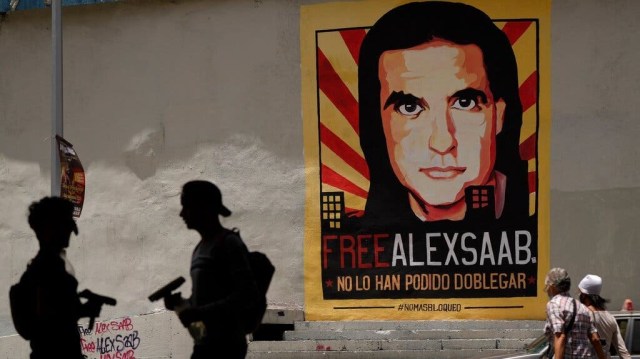
Alex Saab, a Colombian businessman, is accused in the U.S. of siphoning millions from programs intended to help the needy in Venezuela.
By The New York Times – Julie Turkewitz
Oct 16, 2021
The United States extradited a top ally of Venezuela’s authoritarian government on Saturday, his lawyer said, prompting a swift retaliation from Venezuelan officials that immediately threatened a fledgling effort to resolve the country’s political turmoil.
The extradition of Alex Saab, a Colombian businessman and financial fixer for President Nicolás Maduro of Venezuela, to face money laundering charges on American soil was supposed to be a victory for the U.S. government, whose efforts to topple Mr. Maduro have faltered in recent years.
Mr. Saab was detained more than a year ago by law enforcement officials in the West African island nation of Cape Verde. His extradition makes him one of the highest-ranking supporters of Mr. Maduro to be taken into American custody.
But just hours after Mr. Saab was put on a plane to the United States on Saturday, the Venezuelan government re-apprehended six oil executives, including 5 American citizens, who had been under house arrest in Venezuela, according to a lawyer for one of the men.
That same evening, the Venezuelan government also called off negotiations with the American-backed opposition in Venezuela to discuss the conditions necessary to hold free and fair elections.
“By virtue of this very serious action, our delegation announces that it is suspending its participation in the negotiation,” said Jorge Rodríguez, president of Venezuela’s National Assembly and a Maduro ally, in a meeting with reporters on Saturday.
The six oil executives are generally viewed as negotiating pawns in the antagonistic relationship between the United States and Venezuela. They worked for Citgo Petroleum, a Houston-based subsidiary of the Venezuelan state oil company, and have been held by the Venezuelan government on corruption charges since 2017.
But they had been released to house arrest earlier this year in what some viewed as a sign that Mr. Maduro wanted to improve relations with the United States under the Biden administration.
The wife and daughters of one of the executives, Tomeu Vadell, said in an interview that the Venezuelan police appeared outside Mr. Vadell’s home on Saturday around 5:30 p.m. and took him away.
While family members were on the phone with The New York Times, Mr. Vadell, 62, called them on another line to say he was being held at the Helicoide, a Venzeuelan prison known for its harsh conditions. His voice cracked, said his daughter, Cristina Vadell, as he asked them to make arrangements to send water and food, which the Venezuelan government does not supply.
“It’s disgusting to see how governments play and toy with people’s lives, as if they were gods or something, like they’re children fighting for a toy,” said Veronica Vadell, another daughter, who said the U.S. government should not have extradited Mr. Saab before ensuring their father’s safety. “Our dad’s fate is in the hands of the U.S. government and the Venezuelan government, and we can’t do anything about it.”
The extradition of Mr. Saab also threatened to derail the negotiations between Mr. Maduro and Venezuela’s political opposition, which has long been supported by the United States. The talks began in Mexico in September, and the opposition has hoped they will provide an opportunity to pressure Mr. Maduro into holding free and fair elections.
In an interview with The New York Times on Thursday, the head of Venezuela’s political opposition, Juan Guaidó, said he hoped the talks would push the government to play fair during regional elections set for next month, which would then serve as a “trampoline” to mobilize voters to push for a free presidential election in the coming years.
But the Venezuelan government immediately backed away from the talks on Saturday. In a statement condemning Mr. Saab’s arrest, the Maduro government said the move “threatens the good development of the negotiations.”
Mr. Saab’s lawyer, Jose Manuel Pinto Monteiro, claimed in a video sent to reporters that Mr. Saab had been “kidnapped” by the United States.
If Mr. Saab were to cooperate with American officials, he could help untangle Mr. Maduro’s economic web, aiding the authorities in bringing charges against other allies of the Venezuelan government.
Mr. Maduro’s government has maintained that Mr. Saab’s detention is illegal, saying he is a diplomatic envoy and cannot be prosecuted, and his supporters have undertaken an elaborate global public relations campaign to rally support for his cause.
But Cape Verde’s Constitutional Court rejected the diplomatic immunity argument last month and authorized his extradition to the United States to face charges.
A spokeswoman for the U.S. Department of Justice, Nicole Navas Oxman, said Saturday that Mr. Saab is expected to make his first court appearance on Monday in the Southern District of Florida, and that “the extradition was conducted in full compliance with all relevant Cabo Verdean laws and court rulings.”
In 2019, U.S. prosecutors indicted Mr. Saab in connection with a bribery scheme that siphoned an estimated $350 million from a Venezuelan government housing project.
…
Read More: The New York Times – U.S. extradites key financial ally of Venezuela’s President, inciting retaliation
…

